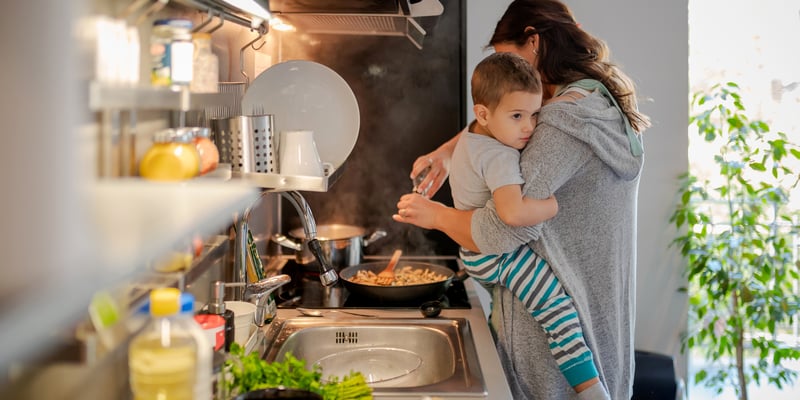The Power of Conversation
Written by Karen Meeker
A breakfast at a restaurant gave me a chance to observe women using the powerful gift of good conversation for building stronger relationships.

Recently, my husband made a welcome suggestion that we go out for breakfast for a change. I certainly didn’t argue.
So off we went.
The place we chose is large with high ceilings and seating in booths or at tables. Our section was virtually empty, so we got our choice—a table situated in a grouping of tables set for foursomes and facing a wall lined with individual booths, only one of which, I noticed, was occupied.
As we scanned the menu, two young women were seated at a table only two down from where we were sitting. One carried an infant car seat with a tiny baby inside, and the other carried the baby necessities. They seated themselves across from each other, positioned the car seat safely within easy reach, and chatted.
Soon another twosome, a pregnant woman and her woman friend, were seated next to each other at the square table next to ours. And, finally, two middle-aged women took a booth across from us, where they immediately began to talk.
Fascinated by the tête-à-têtes around us—with gesturing hands, attentive listening and eye contact—I realized I was witnessing the art of conversation at its finest. And one of the most impressive notables was that there were no devices in use, except for one who briefly consulted her phone for something and then put it away.
These women came for conversation, with some food on the side.
The what and why of conversation
According to Merriam-Webster, conversation is an “oral exchange of sentiments, observations, opinions or ideas.” It can be accomplished using various vehicles: a chat, dialogue, discussion or an exchange, to name a few. It can take place in a myriad of venues at any time.
Healthy conversation gives rise to several benefits:
- Finding the truth.
- Building and strengthening relationships.
- Reaching a mutual understanding.
- Making a commitment.
- Negotiating or reaching a consensus or agreement.
- Transmitting information.
- Producing results and finding solutions.
- Imparting encouragement and facilitating sharing.
- Aligning roles, duties and expectations.
- Learning from each other.
- Intervening and influencing.
Women and conversation
There is a field of study dedicated to gender differences in speech content. Studies find that women use more of a “rapport” approach that is geared toward relationship-building.
I saw that in action: the sharing of probably personal or even intimate information, words animated with facial expressions and gestures, an obvious comfortableness in being near one another, the focused attention they granted each other, and the satisfaction of having the freedom of stream-of-consciousness dialog—not always knowing where the exchange might end but excited to be having the conversation.
Two women, two miracles
I find the account of Mary and Elizabeth fascinating on several different levels, but for now, let’s consider the role conversation played in their lives.
You recall the scene: A young woman, Mary, Joseph’s betrothed, is visited by the angel Gabriel with the astounding news that she, a virgin, will give birth to the Son of God. She is also told that her relative, Elizabeth, will miraculously give birth to a son in her postmenopausal old age.
I imagine Mary’s consternation, even though she accepted this heavenly pronouncement in faith. She was undoubtedly living in her father’s house. She had at least one sister (John 19:25) and probably brothers. She and Joseph were committed to a binding marriage sometime soon.
Who could she share this with other than Joseph (since their betrothal commitment was at stake)? Who would understand what had just happened?
Elizabeth.
Luke records that Elizabeth hid her pregnancy for five months (Luke 1:24)—only her husband knew that a miracle was in progress, and he was temporarily mute. But, in the sixth month of Elizabeth’s pregnancy, Mary was told about it. Recognizing their common miraculous bond, she made haste to visit Elizabeth.
After both acknowledged the gracious hand of God in their lives and gave Him thanks for what He had done for them, Mary stayed with Elizabeth for three months. I can only imagine the conversations that ensued as they came to terms with the wonder of the prophesied events that would change their lives and the world forever.
Theirs was a relationship like no other.
The ultimate bond
Oscar Wilde, the Irish playwright and poet, once penned, “Ultimately the bond of all companionship, whether in marriage or in friendship, is conversation.” I saw bonding at breakfast that morning; I see it in the words and lives of Bible figures, and I am blessed to experience it through the gift of conversation.
The Bible has much to say about good conversation. For example, see the following: Ephesians 4:29; Psalm 19:14; Proverbs 15:1, 4; 16:24.
For suggestions on improving conversations, check out Eddie and Shannon Foster’s four-part series on “Communication Styles.”










